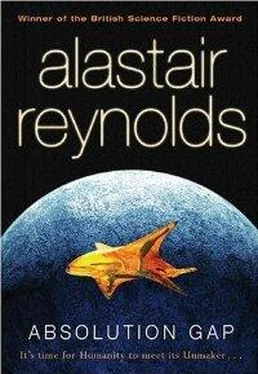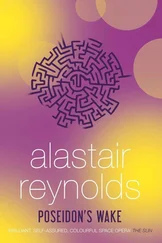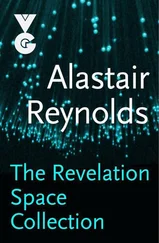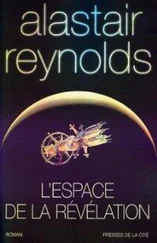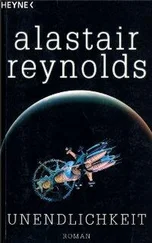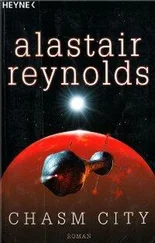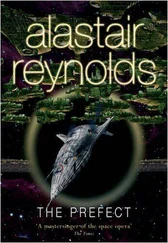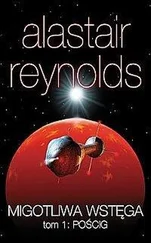But for now, and perhaps for years to come, the system was his. Haldora was the name he had given this world, and until he learned otherwise, it was as official as any other—except that, as Morwenna had pointed out, all he had really done was grab unallocated names from the nomenclature tables and flung them at anything that looked vaguely appropriate. If the system did indeed turn out to be important, did it not behove him to take a little more care over the process?
Who knew what pilgrimages might end here, if his bridge turned out to be real?
Quaiche smiled. The names were good enough for now; if he decided he wanted to change them, he still had plenty of time.
He checked his range to Hela: just over one hundred and fifty thousand kilometres. From a distance, the illuminated face of the moon had been a flat disc the colour of dirty ice, streaked here and there with pastel shades of pumice, ochre, pale blue and faint turquoise. Now that he was closer, the disc had taken on a distinct three-dimensionality, bulging out to meet him like a blind human eye.
Hela was small only by the standards of terrestrial worlds. For a moon it was respectable enough: three thousand kilometres from pole to pole, with a mean density that put it at the upper range of the moons that Quaiche had encountered. It was spherical and largely devoid of impact craters. No atmosphere to speak of, but plenty of surface topology hinting at recent geological processes. At first glance it had appeared to be tidally locked to Haldora, always presenting the same face to its mother world, but the mapping software had quickly detected a tiny residual rotation. Had it been tidally locked, the moon’s rotation period would have been exactly the same as the time it took to make one orbit: forty hours. Earth’s moon was like that, and so were many of the moons Quaiche had spent time on: if you stood at a given spot on their surface, then the larger world around which they orbited—be it Earth or a gas giant like Haldora—always hung at about the same place in the sky.
But Hela wasn’t like that. Even if you found a spot on Hela’s equator where Haldora was sitting directly overhead, swallowing twenty degrees of sky, Haldora would drift. In one forty-hour orbit it would move by nearly two degrees. In eighty standard days—just over two standard months—Haldora would be sinking below Hela’s horizon. One hundred and sixty days later it would begin to peep over the opposite horizon. After three hundred and twenty days it would be back at the beginning of the cycle, directly overhead.
The error in Hela’s rotation—the deviation away from a true tidally locked period—was only one part in two hundred. Tidal locking was an inevitable result of frictional forces between two nearby orbiting bodies, but it was a grindingly slow process. It might be that Hela was still slowing down, not yet having reached its locked configuration. Or it might be that something had jolted it in the recent past—a glancing collision from another body, perhaps. Still another possibility was that the orbit had been perturbed by a gravitational interaction with a massive third body.
All these possibilities were reasonable, given Quaiche’s ignorance of the system’s history. But at the same time the imperfection affronted him. It was as annoying as a clock that kept almost perfect time. It was the kind of thing he would have imagined pointing to if anyone had ever argued that the cosmos must be the result of divine conception. Would a Cre-ator have permitted such a thing, when all it would have taken was a tiny nudge to set the world to rights?
The virus simmered, boiling higher in his blood. It didn’t like that kind of thinking.
He snapped his thoughts back to the safe subject of Hela’s topography, wondering if he might make some sense of the bridge from its context. The bridge was aligned more or less east-to-west, as defined by Hela’s rotation. It was situated very near the equator, spanning the gash that was the world’s most immediately obvious geographic feature. The gash began near the northern pole, cutting diagonally from north to south across the equator. It was at its widest and deepest near the equator, but it was still fearfully impressive many hundreds of kilometres north or south of that point.
Ginnungagap Rift, he had named it.
The rift sloped from north-east to south-west. To its west in the northern hemisphere was an upraised geologically complex region that he had named the Western Hyrrokkin Uplands. The Eastern Hyrrokkin Uplands curled around the pole to flank the rift on its other side. South of the western range, but still above the equator, was the zone that Quaiche had elected to call Glistenheath Ridge. South of the equator was another upraised area named the Gullveig Range. To the west, straddling the tropics, Quaiche identified Mount Gudbrand, the Kelda Flats, the Vigrid badlands, Mount Jord… to Quaiche, these names conveyed a dizzying sense of antiquity, a feeling that this world already had a richly textured past, a frontier history of epic expeditions and harrowing crossings, a history populated by the brave and the bold.
Inevitably, however, his attention returned to Ginnungagap Rift and the bridge that spanned it. The details were still unclear, but the bridge was obviously too complicated, too artful and delicate, to be just a tongue of land left behind by some erosive process. It had been built there, and it did not appear as if humans had had much to do with it.
It was not that it was beyond human ingenuity. Humans had achieved many things in the last thousand years, and throwing a bridge across a forty-kilometre-wide abyss—even a bridge as cleanly elegant as the one that spanned Ginnungagap Rift—would not be amongst the most audacious of those achievements. But just because humans could have done it did not mean that they had .
This was Hela. This was as far out in the sticks as it was possible to be. No human had any business building bridges here.
But aliens? Now that was a different matter.
It was true that in six hundred years of space travel, nothing remotely resembling an intelligent, tool-using technological culture had ever been encountered by humankind. But they had been out there once. Their ruins dotted dozens of worlds. Not just one culture either, but eight or nine of them—and that was only the tally in the little huddle of systems within a few dozen light-years of the First System. There was no guessing how many hundreds or thousands of dead cultures had left their mark across the wider galaxy. What kind of culture might have lived on Hela? Had they evolved on this icy moon, or had it just been a stopover point in some ancient, forgotten diaspora?
What were they like? Were they one of the known cultures?
He was getting ahead of himself. These were questions for later, when he had surveyed the bridge and determined its composition and age. Closer in, he might well find other things that the sensors were missing at this range. There might be artefacts that unequivocally linked the Hela culture to one that had already been studied elsewhere. Or the artefacts might cinch the case the other way: an utterly new culture, never encountered before.
It didn’t matter. Either way, the find was of incalculable value. Jasmina could control access to it for decades to come. It would give her back the prestige she had lost over the last few decades. For all that he had disappointed her, Quaiche was certain she would find a way to reward him for that .
Something chimed on the console of the Scavenger’s Daughter . For the first time, the probing radar had picked up an echo. There was something metallic down there. It was small, tucked away in the depths of the rift, very near the bridge.
Читать дальше
